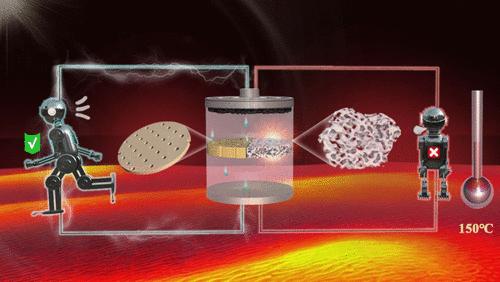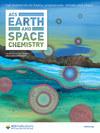Robust, High-Temperature-Resistant Polyimide Separators with Vertically Aligned Uniform Nanochannels for High-Performance Lithium-Ion Batteries
IF 2.9
3区 化学
Q2 CHEMISTRY, MULTIDISCIPLINARY
引用次数: 0
Abstract
Separator is an essential component of lithium-ion batteries (LIBs), playing a pivotal role in battery safety and electrochemical performance. However, conventional polyolefin separators suffer from poor thermal stability and nonuniform pore structures, hindering their effectiveness in preventing thermal shrinkage and inhibiting lithium (Li) dendrites. Herein, we present a robust, high-temperature-resistant polyimide (PI) separator with vertically aligned uniform nanochannels, fabricated via ion track-etching technology. The resultant PI track-etched membranes (PITEMs) effectively homogenize Li-ion distribution, demonstrating enhanced ionic conductivity (0.57 mS cm–1) and a high Li+ transfer number (0.61). PITEMs significantly prolong the cycle life of Li/Li cells to 1200 h at 3 mA cm–2. For Li/LiFePO4 cells, this approach enables a specific capacity of 143 mAh g–1 and retains 83.88% capacity after 300 cycles at room temperature. At 80 °C, the capacity retention remains at 85.92% after 200 cycles. Additionally, graphite/LiFePO4 pouch cells with PITEMs display enhanced cycling stability, retaining 73.25% capacity after 1000 cycles at room temperature and 78.41% after 100 cycles at 80 °C. Finally, PITEMs-based pouch cells can operate at 150 °C. This separator not only addresses the limitations of traditional separators, but also holds promise for mass production via roll-to-roll methods. We expect this work to offer insights into designing and manufacturing of functional separators for high-safety LIBs.

用于高性能锂离子电池的具有垂直排列均匀纳米通道的坚固耐高温聚酰亚胺隔膜
隔膜是锂离子电池(LIB)的重要组成部分,对电池的安全性和电化学性能起着举足轻重的作用。然而,传统的聚烯烃隔膜热稳定性差,孔隙结构不均匀,无法有效防止热收缩和抑制锂(Li)枝晶。在此,我们介绍了一种通过离子轨道蚀刻技术制造的具有垂直排列均匀纳米通道的坚固耐高温聚酰亚胺(PI)隔膜。由此制成的 PI 轨道蚀刻膜(PITEM)可有效均匀锂离子分布,并显示出更高的离子电导率(0.57 mS cm-1)和更高的锂离子转移数(0.61)。在 3 mA cm-2 的条件下,PITEMs 可将锂/锂电池的循环寿命大幅延长至 1200 小时。对于 Li/LiFePO4 电池,这种方法可使比容量达到 143 mAh g-1,并且在室温下循环 300 次后仍能保持 83.88% 的容量。在 80 °C 下,循环 200 次后容量保持率为 85.92%。此外,含有 PITEMs 的石墨/磷酸铁锂袋式电池显示出更强的循环稳定性,在室温下循环 1000 次后容量保持率为 73.25%,在 80 °C 下循环 100 次后容量保持率为 78.41%。最后,基于 PITEMs 的袋式电池可在 150 °C 下工作。这种分离器不仅解决了传统分离器的局限性,而且有望通过卷对卷方法进行大规模生产。我们希望这项工作能为设计和制造高安全性锂离子电池的功能性分离器提供启示。
本文章由计算机程序翻译,如有差异,请以英文原文为准。
求助全文
约1分钟内获得全文
求助全文
来源期刊

ACS Earth and Space Chemistry
Earth and Planetary Sciences-Geochemistry and Petrology
CiteScore
5.30
自引率
11.80%
发文量
249
期刊介绍:
The scope of ACS Earth and Space Chemistry includes the application of analytical, experimental and theoretical chemistry to investigate research questions relevant to the Earth and Space. The journal encompasses the highly interdisciplinary nature of research in this area, while emphasizing chemistry and chemical research tools as the unifying theme. The journal publishes broadly in the domains of high- and low-temperature geochemistry, atmospheric chemistry, marine chemistry, planetary chemistry, astrochemistry, and analytical geochemistry. ACS Earth and Space Chemistry publishes Articles, Letters, Reviews, and Features to provide flexible formats to readily communicate all aspects of research in these fields.
 求助内容:
求助内容: 应助结果提醒方式:
应助结果提醒方式:


